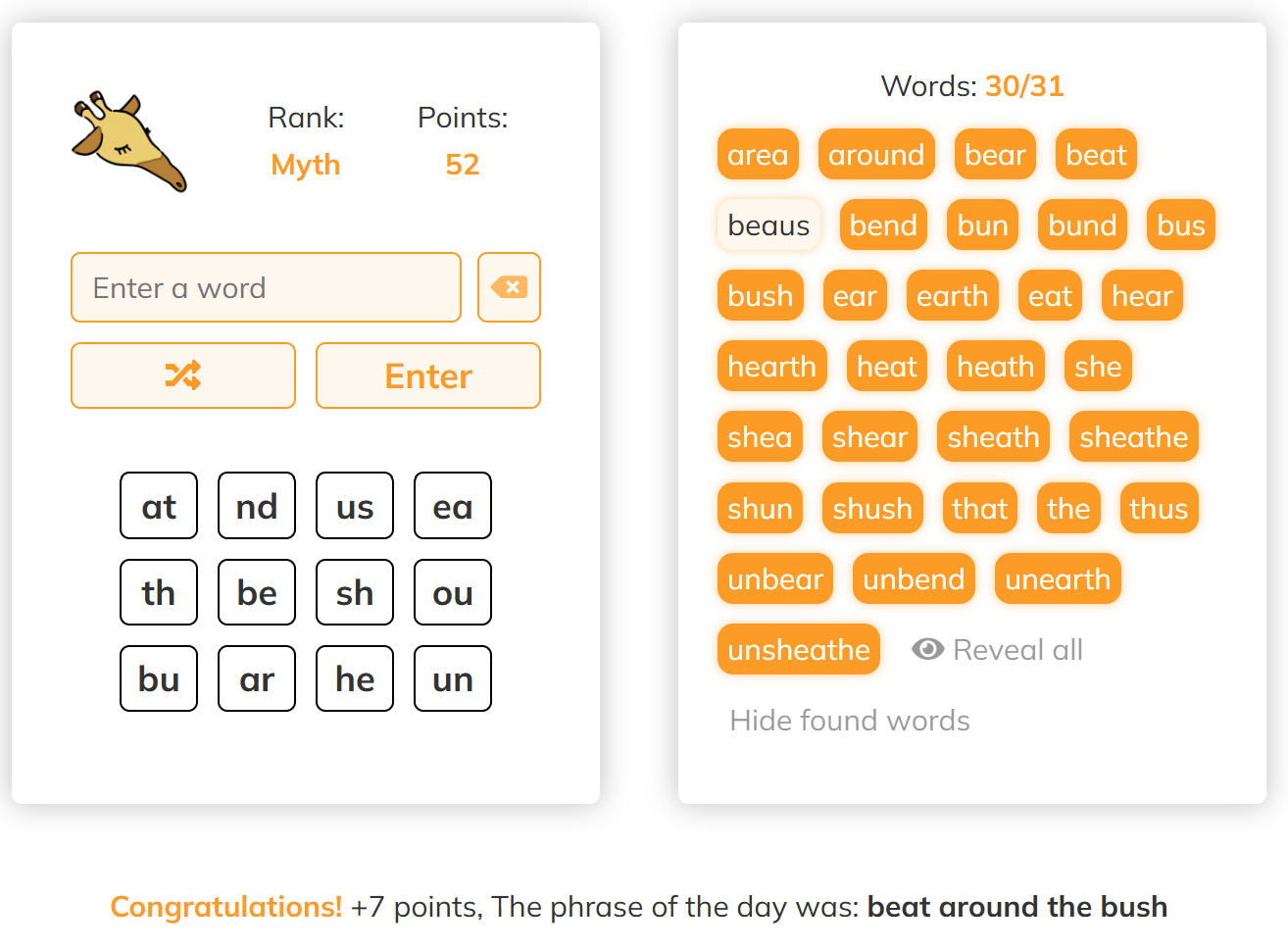November linkstack
Words of the year, a word-y documentary, a new word game, and more. A recipe, even.
Happy U.S. Thanksgiving week and Eternal Black Friday, and welcome to my month-end giveaway of links, links, and more links. Here’s the October linkstack, if you missed it. Let me know in a comment about your own discoveries, online and off-.
This newsletter may exceed Substack’s email limits. To read every last word, click on the headline or download the Substack app.
Bookshelf
My current reading includes Lucky Loser: How Donald Trump Squandered His Father’s Fortune and Created the Illusion of Success, which delivers on the title and then some. Co-authors Susanne Craig and Ross Buettner, who won the Pulitzer Prize for explanatory reporting in 2019, have expanded their New York Times investigation into a book that focuses on Trump’s financial history; it’s a model of Robert Caro–style, turn-every-page document-mining and dogged interviewing. Naturally, the ever-litigious title character has threatened to sue the book’s publisher, Penguin Random House. Read the Washington Post review; read an excerpt of the book. Related and also recommended: Emily Nussbaum’s Cue the Sun!: The Invention of Reality TV, whose final chapter reveals the flim-flam behind “The Apprentice.”
Newsletter recommendation of the month
launched Friends with Words — nice title! — to document her ambition of learning 12 languages in 12 months: “Crazy? Probably. But that matches the crazy times we live in.” Start here, with the one thing you need to learn any language. Then read why Tanya — a Jew who was born in Russia and now lives in Israel — decided to learn Yiddish.Self-promotion break!
I interviewed lexicographer Jesse Sheidlower about his life’s work, The F-Word, now in its fourth edition. (Strong Language)
I also wrote about how the meaning of artisan has shifted. It’s now the name of an AI company. (Medium gift link)

I’m cited in The Guardian’s November 21 story about “kakistocracy” (but the attribution is incorrect: there was no Substack in 2016). I wrote about the word more recently, right here on Substack.
It’s WOTY season
Some major English-language dictionaries aren’t waiting till the end of the year to anoint words of the year. Cambridge Dictionaries chose manifest. Collins Dictionary selected brat. (It’s on my list, too: see my post on brat from June.) Oxford University Press picked a shortlist and is inviting the public to vote; the deadline is Friday, November 28.
The American Dialect Society, which has been picking words of the year since 1990, will hold off until January 10 to make its selection; if you’re in Philadelphia that evening, come on down and join the scrum: the voting session will be open to the public. (And it’s a hoot!) The ADS welcomes nominations; submit up to three choices here.
How about the name of the year? The Namerology blog is soliciting nominations: “Past NOTY’s have reached all corners of our culture, from comedy to conflict. They’ve reflected their moments in technology, like Siri; politics, like Barack; pop culture, like Barbie; religion, like Francis; medicine, like Delta. And then there was Boaty McBoatface.”
A documentary about grammar? Yes, please.
“One fall day in 2018, Ellen Jovin set up a folding table on a Manhattan sidewalk with a sign that said ‘Grammar Table.’ Right away, passersby began excitedly asking questions, telling stories, and filing complaints.” Ellen eventually took her table to all 50 states and wrote a book about the experience. (Read my 2022 review.) Now Rebel with a Clause is being turned into a documentary, and there’s a Kickstarter to close the funding gap. Donate!

In flight no longer
You’ll have to find something else to read: “[W]ith the last print issue of Hemispheres, the in-flight magazine of United Airlines, and the last such magazine connected to a major US carrier (with the exception of Hana Hou!, for Hawaiian Airlines), it is the end of an era.” (Lucy Schiller for Columbia Journalism Review)
Grounded
Speaking of air travel, a federal judge has ordered the Oakland International Airport to stop using “San Francisco” in its name. Let’s see if the ruling sticks. (Oaklandside) Here’s my take from last year:
Can Oakland International Airport's problems be fixed with a name change?
Earlier this week, Bay Area news outlets reported that Oakland International Airport (OAK) was considering a name change. Inbound air travelers, it seems, aren’t aware that Oakland is right across the bay from San Francisco (whose airport, by the way, is farther from downtown San Francisco than Oakland’s is).
No “soup” for Campbell’s
After 155 years and considerable expansion into non-soup categories like pasta sauca, the Camden, New Jersey–based company is dropping “soup” from its name and will be known as The Campbell’s Company. (AP)

Jag war
There’s been a ton of reaction to Jaguar’s new wordmark, logo, and “social media tease,” revealed last week ahead of the carmaker’s December 2 relaunch as an electric-only brand. Part of the backlash is attributable to the new branding’s dramatic and frankly weird break with century-old tradition. And part of the response — what the company’s managing director (the equivalent of CEO) called “vile hatred and intolerance” — can be chalked up to that old standby: People hate change. (See: the Zajonc effect.) On LinkedIn, marketing mavens weighed in with comments like “What was the brief?!” and “a total departure from the essence of Jaguar rather than a return to core values” and “disastrous.” On the r/Jaguar subreddit, responses ranged from “Looks like a cheap Chinese AI/IT company” to “What in the name of Ziggy Stardust is this??” But there’s no such thing as bad publicity, as EV reporter James Morris observed in Forbes: “At the time of writing, the video has had 1.5 million views, and over 24,000 comments. I can’t remember any automaking launch or rebrand getting this much attention in all my years writing about the car industry.” He called the rebrand “absolute genius.” I’ll let you judge for yourself. My own critique? I think the wordmark is OK and the redesigned cat is elegant. I hate the copy, especially “Create exuberant” and “Live vivid,” two examples of anthimeria: the use of a word outside its customary part of speech. I’ve been kvetching about anthimeria in advertising for almost two decades. “Copy nothing”? Don’t make me laugh.
A new word game
Play Nomido — an anagram of “domino” — by putting together letter pairs from the grid to create words. (From The Browser, which also publishes a highly readable newsletter)
Shitmanteau alert!
Is “Glicked” this year’s “Barbenheimer”? Etymology maven John Kelly teases out the logic, such as it is, behind the latest effort at a mashed cinema title: “Two syllables. Glickèd. As pronounced to rhyme with wicked. Not as we would expect—in the magic that is our deep, automatic knowledge of how English works—to rhyme with flicked.” (Mashed Radish)
And speaking of movies
“The strange reason nearly every film ends by saying it’s fiction (you guessed it: Rasputin!)” (Slate, published in 2016, but new to me. Thanks, Kottke!)
Dog’s life
History! Mystery! Theology! Badgers! The story of how modern Hebrew developed a word for “dachshund” is a testament (pun intended) to human creativity. (Elon Gilad; click the image to view the reel.)
From Russia with comradeship
introduced me to the useful word tusovka: Roughly speaking, a tusovka—at least back in the early nineties, when I lived and worked in Moscow, and you could get arrested for criticizing the government or speaking with a foreigner like me without a minder present—was a group of likeminded and trusted individuals who would gather in each other’s cramped kitchens to chat and speak their unfiltered minds with each other and with us foreigners. Not just about about the Orwellian indignities of living under the lies, hypocrisies, and terrors of a dictatorship, but about everything: the latest gossip, breakups, scandals; where to get bread when the bread stores were all empty; which government officials could be bribed with a meal at Pizza Hut and which preferred a bottle of Jack Daniels or a carton of Marlboros; the markets to avoid if you didn’t want to ingest radiation from Chernobyl with your tomatoes; or, related, where to buy a geiger counter.
Einstein didn’t say that
And neither did Mark Twain, probably. Garson O’Toole, aka the Quote Investigator, explains how viral misquotes evolve and replicate. (BigThink)
Awww of the month
A Missouri elementary school building has been named after a beloved janitor. (CNN, via Next Draft by
)France WTF?
“Cradle-to-grave acronyms are an inescapable feature of life in France. Political parties, schools, taxes, subsidies, public and private institutions and more are known by jumbles of letters, ranging from the short—this summer’s Olympic Games became the JO—to the strangely long, such as CNFCSTAGN, which refers to a training center for officers in the gendarmerie.” (Wall Street Journal free link)
The paranoid style
“[I]n recent years, facial recognition software has altered the calculus of symbolic, attention-getting protest dress, requiring those who choose visibility to reckon with the risk of diminished anonymity.”
on anti-surveillance clothingWIRED remorse
“The internet has gone terribly wrong, or so common wisdom has it. . . . But let’s come clean: WIRED is also part of the problem.” Thirty years after the launch of HotWired — one of the first media websites — WIRED staffers reflect on origins and outcomes. (An oral history recorded and edited by
)Eat something!
Enough gloom! This recipe for sweet potato and halloumi chopped salad, from
’s nicely named newsletter, is my favorite new recipe: It’s harvest-y and Thanksgiving-y and vegetarian and just exceptionally good. The recipe name is a tease; the salad also includes garbanzo beans, brussels sprouts, apple, red onion, and a piquant honey dressing. I think you could make it vegan by substituting savory baked tofu — something like this — for the halloumi, although fried halloumi is pretty darned tasty.






This is a great linkstack. I've wanted to something similar but wasn't sure what frequency would work, and this persuaded me that monthly is ideal. The design is especially appealing in its fine balance of art and text. Thanks so much for the inspiration.
Daughter and I were gutted to fly DEN-EWR yesterday without our beloved Hemispheres magazine. It was the perfect non-commitment airplane diversion.